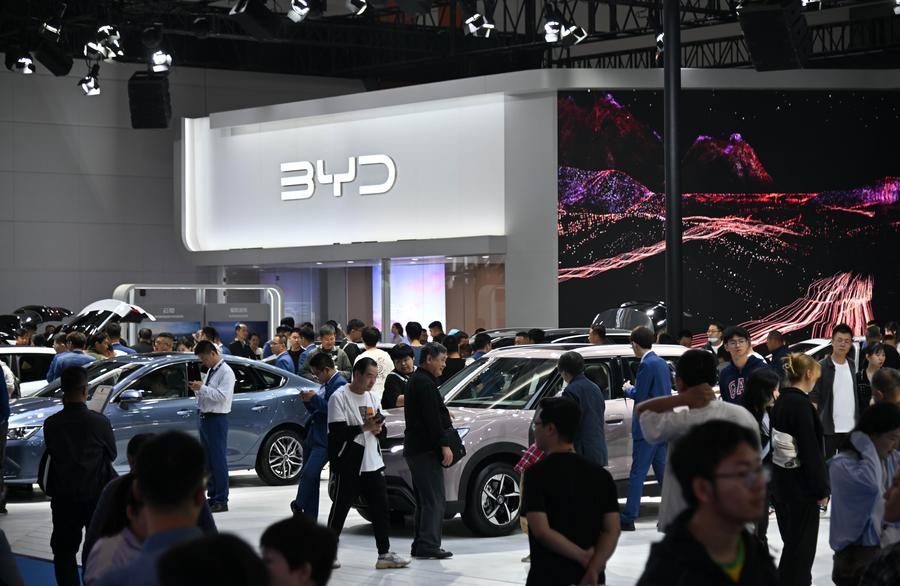
People visit the exhibition booth of BYD at an auto show in Xi'an, Northwest China's Shaanxi province, May 1, 2024. [Photo/Xinhua]
The US and China have been recently trading barbs over Chinese electric vehicles (EVs). The US accuses Chinese EVs of overcapacity, claiming they disrupt both the US and global markets and pose risks, including information security concerns. The US has unilaterally imposed a 100 per cent tariff rate on Chinese EVs. China, on the other hand, asserts that its EV industry represents advanced capacity that helps combat climate change and promote global green transition, and accuses Washington of undermining fair and free trade and competition.
The fierce debate between the two major countries mirrors past disputes. Similar to today's EV dispute, there was an incident regarding gasoline-powered vehicles in the early 20th century.
When gasoline-powered automobiles first hit the market, they were costly and produced in limited numbers, making them a luxury exclusive to the wealthy. Ford Motor Company transformed the industry by introducing standardization and assembly line production, which significantly reduced manufacturing costs and boosted production. This innovation led to a substantial decrease in prices, making cars affordable and accessible to the masses. Despite strong opposition from luxury car brands and their interest groups, the Ford Model T, known for its quality and affordability, quickly gained widespread popularity globally. Ford's pioneering production techniques helped the company overcome various challenges, spurred technological advancement and increased revenue across the automotive supply chain. It also revolutionized people's modes of transportation and transformed the automotive industry and related sectors.
Throughout history, similar debates have arisen over emerging capacities, with Ford's automotive revolution being perhaps the best known one. In essence, these debates represent the clash between progress and conservatism, between the advanced and the outdated. In many ways, the history of human civilization is a history of the adoption of advanced capacity.
The popularization and transfer of advanced capacity have often led to clashes with outdated capacity and its interest groups. But not all stories have a happy ending as Ford did.
In the 1980s, Japan's semiconductor industry rapidly expanded its global market share with world-leading manufacturing and design capabilities, posing a significant threat to American semiconductor producers who used to dominate the market. Obsessed with their dominant position, these American companies lobbied the US government to label Japan as setting "structural barriers", and to impose high punitive tariffs on Japanese semiconductors. By inflating the prices of Japanese products, the US firms reclaimed their market share through non-market approaches. Unfortunately, Japan failed to defend its own interests or seek resolution through the General Agreement on Tariffs and Trade (GATT), nor did global buyers unite to support Japan's semiconductor producers. As a result, the advance of the semiconductor industry was stunted, and international trade was used more and more as a weapon, warping the global industrial and supply chains.
Stories of Ford and Japan's semiconductor industry show that current suppression on Chinese EVs is essentially a confrontation between advanced capacity and entrenched interests.
Ford's success proves that advanced capacity is bound to outcompete the outdated forces and gain wider support since it drives industrial advancement and benefits the people. By contrast, the decline of Japan's semiconductor industry tells us that advanced capabilities are likely to be crippled under the pretext of "overcapacity" if no action is taken. Outdated capacity does not phase out naturally. Progress can prevail only through concerted efforts.
Chinese EVs, representing green energy and smart technologies, will help tackle climate change and bring a better life to the people. To better meet demands of people from all countries, more and cheaper Chinese EVs are needed. This also requires us to extend stronger support to Chinese EVs in a more open way. Such support is not for China only, but for every one of us and for human advancement as a whole.
编辑:齐悦